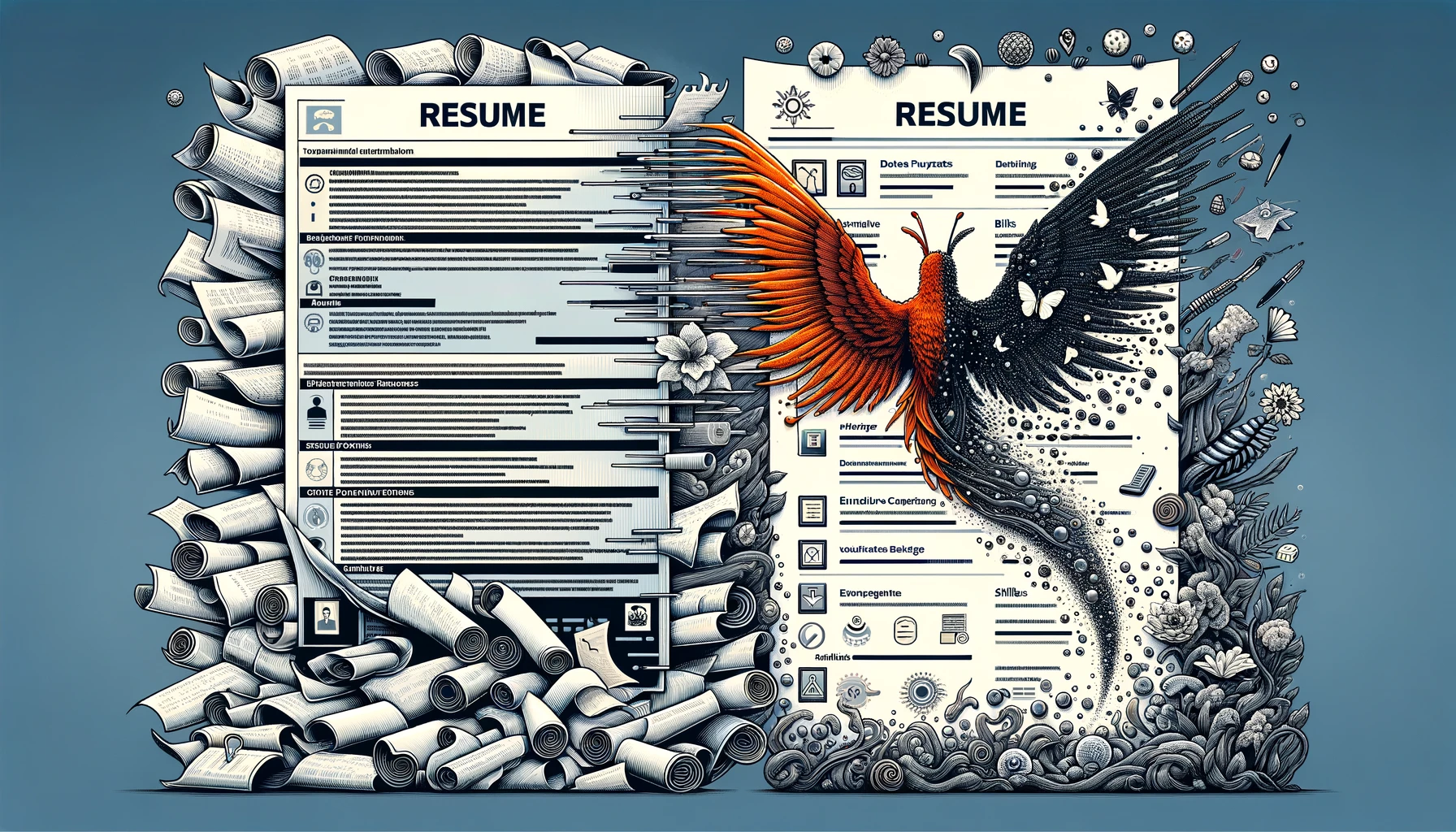In the competitive landscape of job hunting, a well-crafted resume serves as your golden ticket to unlocking doors of opportunity in the professional realm.
It is not merely a piece of paper detailing your work history; rather, it encapsulates your unique blend of skills, experiences, and aspirations – a snapshot that can either propel you towards success or relegate you to the pile of overlooked candidates. Your resume is essentially your personal brand ambassador, speaking on your behalf when you’re not present to advocate for yourself.
But here’s the twist: amidst the plethora of advice circulating on how to perfect this crucial document, there exists a sea of misconceptions and outdated practices that can potentially sabotage your chances instead of amplifying them.
What if I told you that some commonly touted resume tips are actually misguiding job seekers down unfruitful paths? This article aims to debunk these myths, shed light on why certain age-old advice no longer holds water in today’s dynamic job market, and empower you with insights that will revolutionize the way you approach crafting your resume.
So buckle up as we embark on a journey through the labyrinth of resume wisdom – separating fact from fiction and guiding you towards wielding a powerful tool that truly showcases your worth as a professional.
Identifying Common Myths
When it comes to resume advice, there are a few persistent myths that continue to mislead job seekers. One of the most prevalent misconceptions is the belief that a resume must fit onto one page at all costs.
While brevity is crucial, sacrificing essential details for the sake of length can undermine your chances of standing out. Instead, focus on conciseness and relevance by including only pertinent information that showcases your skills and experiences effectively.
Another myth revolves around design preferences, with some outdated advice suggesting elaborate fonts, colors, or graphics to make your resume visually appealing. However, in today’s competitive job market, simplicity reigns supreme.
Opt for clean layouts and professional formatting to ensure readability and clarity. Remember, recruiters value substance over style – your qualifications should shine through without being overshadowed by flamboyant design elements.
Lastly, let’s debunk the myth surrounding objective statements. Traditionally deemed necessary to specify career goals, objective statements have lost their relevance in modern resumes.
Rather than stating what you seek from a position, focus on crafting a compelling summary or professional profile that highlights what you offer as a candidate. By aligning this section with the employer’s needs and showcasing your value proposition upfront, you create a more impactful first impression that resonates with hiring managers looking for top talent.
Debunking Each Myth with Rationale
In the world of resume writing, conventional wisdom often dictates that resumes should strictly adhere to a one-page limit. However, this advice fails to consider the depth and relevance of an individual’s experiences. Limiting oneself to a single page can result in crucial information being omitted, potentially underselling one’s qualifications.
Research shows that recruiters spend an average of 7-seconds reviewing a resume before making an initial decision. In this limited time frame, it is essential for job seekers to showcase their most pertinent achievements and skills effectively, even if it means extending beyond the traditional one-page boundary.
Another prevailing myth advises job seekers to include objective statements at the beginning of their resumes. These generic statements often lack substance and fail to convey what truly sets a candidate apart from others.
Instead of wasting valuable space on vague objectives, smart job seekers opt for professional summaries or career profiles that highlight their unique skills, accomplishments, and career goals concisely. By providing recruiters with a snapshot of their value proposition right at the start, candidates can capture attention more effectively than with outdated objective statements.
Providing Alternative Strategies
When it comes to crafting a standout resume, it’s essential to navigate beyond the confines of conventional wisdom and explore alternative strategies that truly resonate with recruiters. One such strategy involves ditching the outdated objective statement and opting for a compelling summary instead.
Rather than stating what you seek in a job, a summary allows you to showcase your value proposition upfront, highlighting key skills and achievements that make you an ideal candidate.
Additionally, challenging the one-page rule can open up new opportunities for job seekers looking to fully convey their experience and qualifications. While concise resumes are valued, sacrificing crucial details just to fit onto a single page may do more harm than good.
Embracing a two-page format can provide ample space to paint a comprehensive picture of your professional journey without compromising on readability or content depth. By embracing these alternative approaches rooted in contemporary resume writing practices, candidates can effectively differentiate themselves in today’s competitive job market.
Unshackling Your Resume: The Power of Authentic Success Stories
Many job seekers have been conditioned to believe that resumes should follow a conventional format, listing duties and skills in a standardized manner. However, the most impactful resumes often diverge from this norm by highlighting genuine success stories.
Consider Mark, a recent graduate who infused his resume with anecdotes of how he spearheaded a charity drive during an internship—a move that not only showcased his leadership skills but also painted a vivid picture of his proactive nature to potential employers.
Moreover, success stories serve as tangible evidence of your abilities while injecting personality into your resume. Rather than drowning in a sea of bland bullet points, Jennifer took the bold step of narrating how her innovative approach boosted sales figures by 30% in her previous role.
This storytelling technique not only resonated with hiring managers but also set her apart from other candidates who merely listed their achievements without context or emotion. By weaving authentic narratives into your resume, you demonstrate both competence and character—critical elements that recruiters seek in prospective employees.
Don’t Fall for the Myth of One-Size-Fits-All Conclusions
In the world of resume writing, there’s a prevailing myth that all job applications should end with a generic and predictable conclusion. This advice often suggests wrapping up your resume with a vague statement like References available upon request or Thank you for considering my application.
However, savvy job seekers understand that conclusions are not one-size-fits-all; they are an opportunity to leave a lasting impression on hiring managers. Instead of opting for clichés, consider using this space strategically to reiterate your value proposition and showcase what makes you the ideal candidate for the role.
Craft a Compelling Call-to-Action That Leaves Recruiters Impressed
Rather than treating your conclusion as an afterthought, view it as a powerful tool to compel recruiters to take action. Think about ending your resume with a strong call-to-action that directs hiring managers on the next steps they should take.
Whether it’s inviting them to review your online portfolio, emphasizing your enthusiasm for discussing potential opportunities further in an interview, or highlighting specific achievements relevant to the job at hand—the key is to make sure your conclusion motivates recruiters into wanting more.
By personalizing this last section of your resume and focusing on actionable steps, you demonstrate initiative and set yourself apart from candidates who settle for stale endings that lack impact.
The Myth of One-Page Resumes
While the idea of condensing your entire professional history onto a single page may seem appealing, the one-page resume rule is more myth than necessity in today’s job market. The truth is, hiring managers are more interested in relevant experience and skills rather than the length of your resume. By adhering strictly to this outdated advice, you might be doing yourself a disservice by omitting valuable details that could set you apart from other candidates.
In reality, a two-page resume can provide ample space to showcase your accomplishments, elaborate on key experiences, and highlight crucial skills that align with the job requirements.
Instead of being constrained by an arbitrary page limit, focus on crafting a well-organized document that effectively captures your qualifications and achievements. Remember, quality trumps quantity when it comes to impressing potential employers with a comprehensive and impactful resume.





